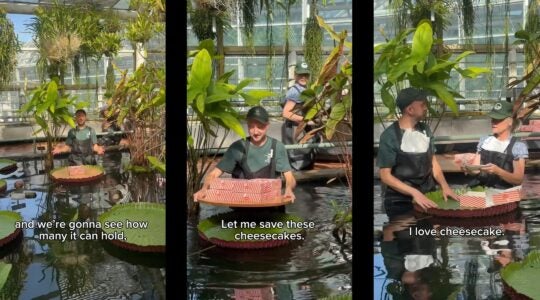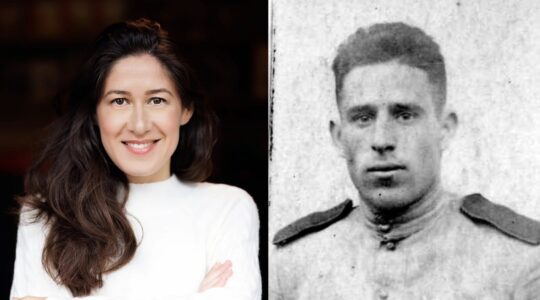On a chilly spring morning, I faced my grandmother’s grave for a second time, there to mark the ritual unveiling of her tombstone. My grandmother, a woman of good cheer and many years, seemed to hover about the small gathering, lending the day a bittersweet spirit.
But what I remember distinctly about that morning of mourning, is not just the moment when my 8-year-old daughter Talia and I huddled together and blinked back tears as we stared at the gravestone. What I also recall is the other goodbye.
In the parking lot after the ceremony, I leaned into a car to embrace my Great Aunt Havy, one of my grandmother’s four younger sisters. A black billowy cape wrapped stylishly about her, her lipstick perfect, her mouth turned up in a beaming smile, she squeezed my hand. Then, in her strong and musical voice, she issued an invitation. I’m turning 85 this summer, she said. I want to celebrate with the world.
I looked down at the large boot that covered her right foot. I thought about last November, when we learned that Havy had been in car accident, hit by a 17-year-old driver, and how she’d broken her neck, fractured three ribs, bruised a lung and mangled her ankle so severely that bones protruded through the skin. She could have died. I thought about the way I felt now, comforted, comfortable. In her hands, I understood the world to be a good place.
Now, it’s not for everyone that I would brave the Long Island Expressway and the New Jersey Turnpike on one July Sunday, traveling at least six sticky hours round-trip with two squirmy children in the backseat. And it’s not just because I’ve always reserved a soft spot in my heart for these great aunts, who loomed larger than life in my childhood with their quick tongues and big personalities; these aunts who traveled to my grandmother’s bedside each week in recent years, regaling her with Yiddish songs and amusing stories.
There’s something about Havy, and the way she confronted what could have been a devastating experience that makes me not only want to celebrate with her, but to share her story too.
Havy, who lives in an adult community in New Jersey, puts it this way: “I look around me, and I see people who are 10, 15 years younger than I am, and they’re feeling, ‘Is it all worth it? I’m finished.’ Whereas, she says, “I feel the whole world is in front of me and I’m not sure what to do next.”
Havy, who is better known outside of our Goldfarb family circle by her English rather than Yiddish name, Edith Fein, still hobbles about in a boot to protect her foot. She may never drive again. But she travels by car service to her volunteer job, performing clerical tasks for a local hospital. She’s returned to her part-time paid job too, bookkeeping for a local psychologist. She doesn’t look back.
“Since the accident,” she says, “I truly find good in people who I wasn’t crazy about before.”
Many seniors would agree with my Grandpa Harry, who would often quip, “Old age, it ain’t what it’s cracked up to be” — and he didn’t mean that it was better. My friend Renee Septimus, a geriatric social worker who recently worked at the 92nd Street Y, notes, “I always say that old age is the story of loss — of physical and mental abilities, and of family members and friends, sometimes of one’s home.”
And yet, some seniors bounce through misfortunes with a buoyancy of spirit. We all know about the role of active minds and active bodies and the importance of a social network in aging gracefully. But there’s also something else, I think. According to family lore, Havy’s father, my great grandpa Izzy, smiled incessantly, all the while struggling to support eight children. After a day of peddling, Havy recalls, Izzy would come home from work, touch the radiator and tell his wife, “Mein Razele do you know how lucky we are to have a warm house?”
Perhaps it’s no wonder then that Havy views life through the same rose-colored glasses. My grandma owned a pair too.
|
Signup for our weekly email newsletter here. Check out the Jewish Week’s Facebook page and become a fan! And follow the Jewish Week on Twitter: start here. |
The New York Jewish Week brings you the stories behind the headlines, keeping you connected to Jewish life in New York. Help sustain the reporting you trust by donating today.




